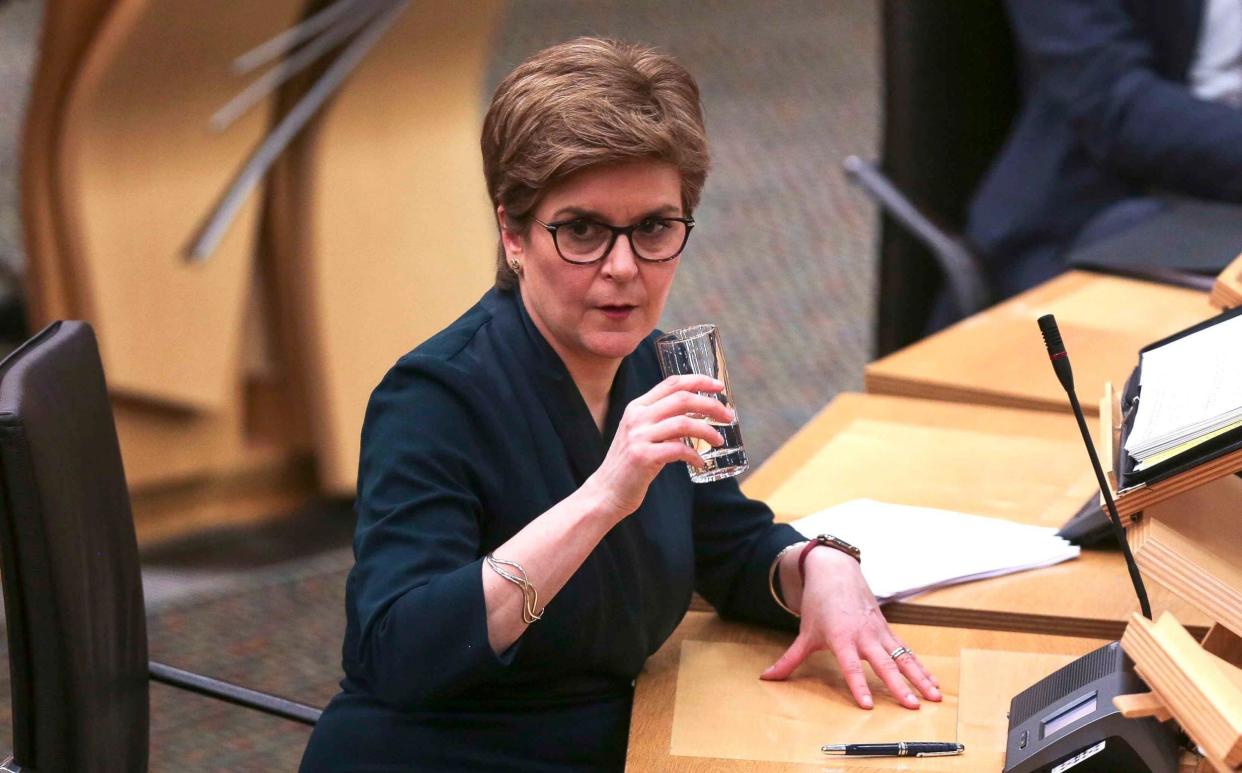Nicola Sturgeon’s transgender reforms ‘could be harmful to women and should be stopped’

- Oops!Something went wrong.Please try again later.
Nicola Sturgeon’s plans to overhaul transgender laws in Scotland risk proving damaging to women and should be shelved, the UK’s equalities watchdog has said.
The Scottish Government faced renewed calls to abandon the controversial proposals, after the “serious and substantial intervention” by the Equality and Human Rights Commission (EHRC) backed up concerns of feminist campaigners.
In a major reversal from its previous stance, the body urged the Scottish Government to halt proposals to make it far easier to legally change gender, claiming that the existing system struck the right balance between protecting transgender people and women.
It backed fears, repeatedly dismissed by SNP ministers and pro-trans lobby groups, that the “potential consequences” of the changes would impact on fields such as sport and criminal justice, as well as “measures to address barriers facing women”.
The Scottish Government is expected to publish legislation within weeks which would allow people to “self-declare” their own gender, removing the need for a medical diagnosis, to obtain a gender recognition certificate.
It also wants to cut the time in which someone must live in their “acquired gender” from two years to three months and open up the process to 16- and 17-year-olds.
Critics attack ‘deeply disappointing’ intervention
However, the EHRC said it now believed that the “established legal concept of sex”, coupled with protections against discrimination for transgender people, struck the “correct balanced legal framework” that “protects everyone”.
The move provoked a backlash from pro-trans campaigners, who questioned the motives of the EHRC. The organisation is operationally independent of government, but its chairman, Baroness Falkner of Margravine – the cross-bench peer and member of the Liberal Democrats until 2019 – and commissioners are appointed by UK ministers.
Tim Hopkins, the director of the Equality Network, accused the body of “failing to stand up for equality for trans people”.
He said: “We do not need UK government appointees telling us in Scotland how to legislate in devolved areas, and we look forward to the Scottish Government proceeding with the legislation soon, as has been promised many times.”
Maggie Chapman, an MSP for the Scottish Greens, a party in coalition with the SNP at Holyrood, branded the intervention “deeply disappointing”, while the charity Stonewall labelled it an “attack on trans equality”.
Feminist groups rejoice at watchdog’s ‘validation’
However, the statement delighted grassroots feminist groups, which have been campaigning against the changes.
Critics have claimed that the proposals could put women at risk by opening up female-only spaces such as prisons, changing rooms and refuges to anyone who simply claims they identify as female.
Ms Sturgeon enraged opponents last year when she told them their concerns were “not valid”.
Susan Smith, a director of the For Women Scotland group, said: “We are delighted that the EHRC agrees that the views of so many women are, after all, valid.
“We only wish that the Scottish Government had taken the time to engage thoroughly and in good faith at the start of the process rather than simply relying on their funded groups and failing to engage with opposing views.”
In a 2020 response to a Scottish Government consultation, the EHRC backed a “simplified system” for “obtaining legal recognition of gender through a change in legal sex”.
Sources at the body acknowledged on Wednesday night that the new position, set out in a letter to Shona Robison, the SNP minister in charge of the reforms, represented a significant reversal.
Similar plans to simplify the process of obtaining a gender recognition certificate in England and Wales had been proposed by the UK Government under Theresa May, but have since been abandoned.
The EHRC said it supported plans in England to lower the cost of a gender recognition certificate and criticised “unacceptably long waiting times for gender identity services”.
However, Baroness Falkner added: “We otherwise consider that the established legal concept of sex, together with the existing protections from gender reassignment discrimination for trans people and the ability for them to obtain legal recognition of their gender, collectively provide the correct balanced legal framework that protects everyone.”
A spokesman for the Scottish Government said: “We will consider the EHRC’s views, which have changed from their response to the 2019 consultation, along with those of others ahead of introduction of the Bill.
“We appreciate the range of views on proposals to reform the Gender Recognition Act. We have always been keen to seek consensus where possible, and to work to support respectful debate, and will continue to do so.
“We have now consulted twice on our proposed changes. First on the principles of reform in 2017, and then in 2019 on a draft Gender Recognition Bill. We have published independent analyses of responses to both consultations.
“Our proposals to reform the current Gender Recognition Act do not introduce any new rights for trans people or change single sex exceptions in the Equality Act. Our support for trans rights does not conflict with our continued strong commitment to advance equality and to protect and uphold women’s rights.”

